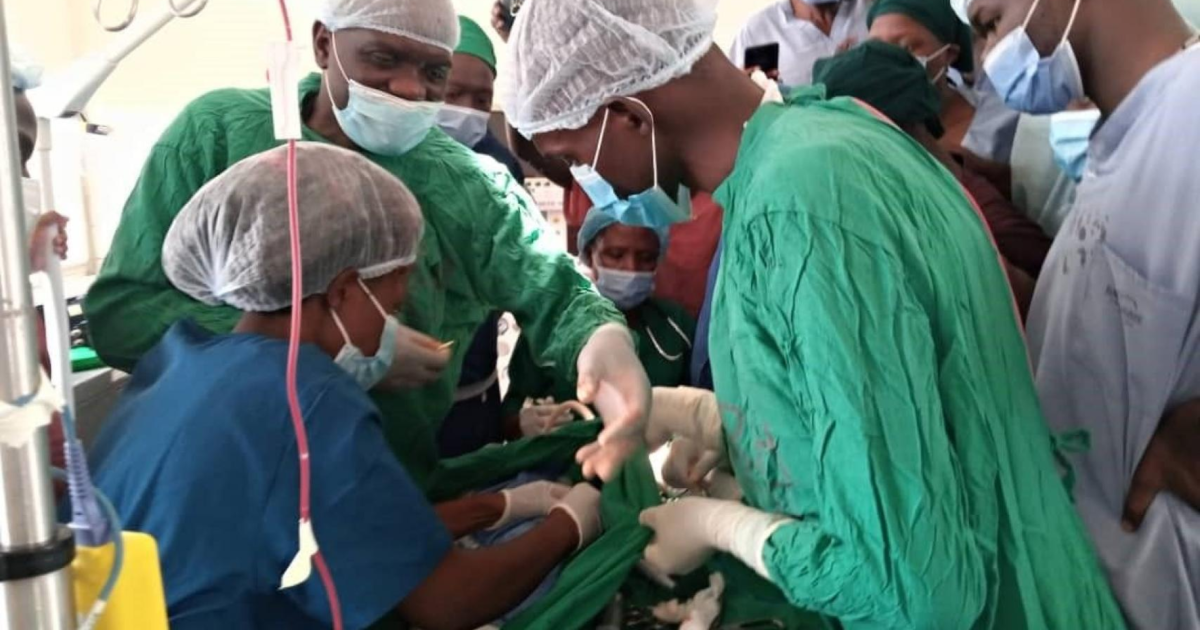Doctors separating the conjoined twins
Joyce Alinga, a resident of Aujongor Village, Obalanga Sub-County in Kapelebyong district conceived during the covid-19 lockdown in 2021.
The 21- year- old of senior three students gave birth to conjoined twins in Amuria Health Centre IV in Amuria District by cesarean section.
Looking at the conjoined twins, the health officials referred the children to Soroti Regional Referral Hospital.
However, the matter seemed too complicated for the Soroti Hospital.
It sent the case to Mulago National Referral Hospital, Mulago.
Unfortunately, the doctors at Mulago were too busy to attend to them in time, compelling the twin’s grandfather Paulo Oluo to return to Soroti hospital.
Alinga could not attend to the twins because she was still recovering at Soroti Hospital.
It was now six days since the conjoined twins had been delivered.
“Seeing how hapless the grandfather was moving around with conjoined twins, one of them dead and another living, we had to do something,” says Dr. Joseph Cuthbert Epodoi, a senior consultant surgeon at Soroti Referral hospital.
He adds: “By then, the dead child’s skin was peeling off and he was beginning to give off a pungent smell.”
Dr. Sr. Mary Margaret Ajiko also a consultant surgeon at the hospital says when they saw the conjoined twins had come back, they studied them. They discovered some organs were being shared while others were not.
“The conjoined twins were sharing the right lobe of the liver and the ribs,” she says, “but the other vital organs like the heart and the lungs were separately used.”
The doctors in Soroti hospital redrew their plans and decided to operate on the twins. The National Medical Stores (NMS) was right at the Centre of this successful miracle.
“We really want to thank the NMS, at least in this hospital here, we had all the basics we needed for the operations,” states Dr. Epodoi.
Dr Epodoi said NMS supplied them with gauze, cotton, some of the anesthetic drugs and the switches that were used in the operation, making the work easier.
This operation underscores the role of a robust medical supply system in saving lives.
NMS is a government agency mandated to procure, store and distribute essential medicines and medical supplies mainly to public health facilities.
Dr Epodoi says medical personnel need to be creative in management of medical supplies to avoid wastage or unnecessary referrals.
“It is true that there are shortcomings here and there in terms of medical supplies due to budget constraints but you might find that one item can do different things,” he says.
“Let us not become fixated.”
While thinking outside the box, Dr. Epodoi says there are some peculiar drugs, which people need that cannot be used anywhere, for example switcher materials.
“Some surgeons would prefer specific switchers for specific outcomes,” he says, “but for us we used that which was available.”
Before the surgery, which lasted for three hours, Dr. Epodoi reveals there was a short prayer led by a reverend sister who was part of a team of 15 physicians who helped in the surgery.
“We had to make sure that we spent as little time as possible in order to save the living baby and minimize any risks that could endanger him,” he says.
For those who believe in prayer, Dr. Epodoi says that you should first have the skills before you exercise what you do. Otherwise prayers are futile if you do not know what you are doing.
In order to succeed, Dr. Epodio advises surgeons to “give it a 100 percent, prepare yourself, never think you know, always be a student and don’t take anything for granted.”
It should be noted that it was also here at the Soroti Referral Hospital that the first ever baby implanted in the liver was successfully operated upon.





